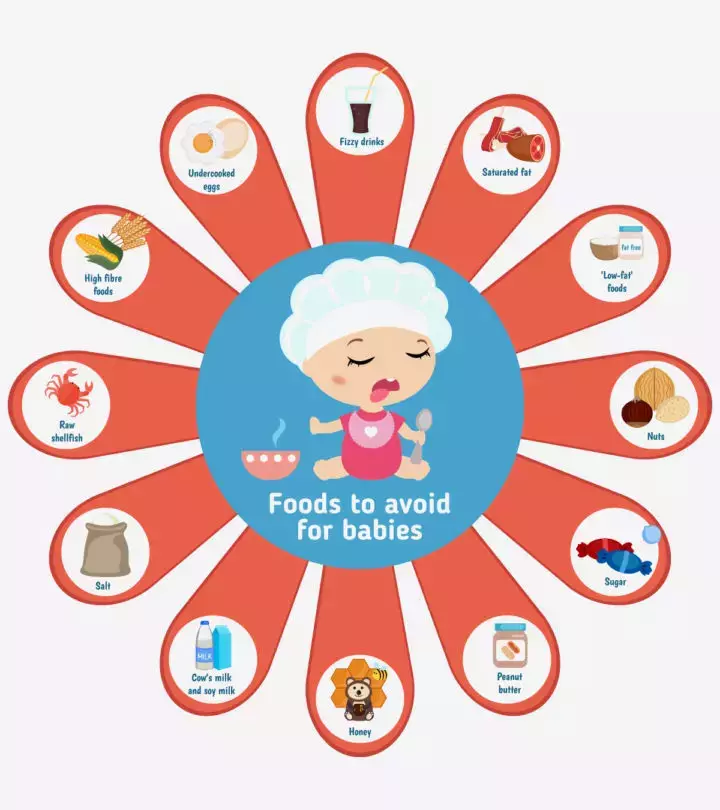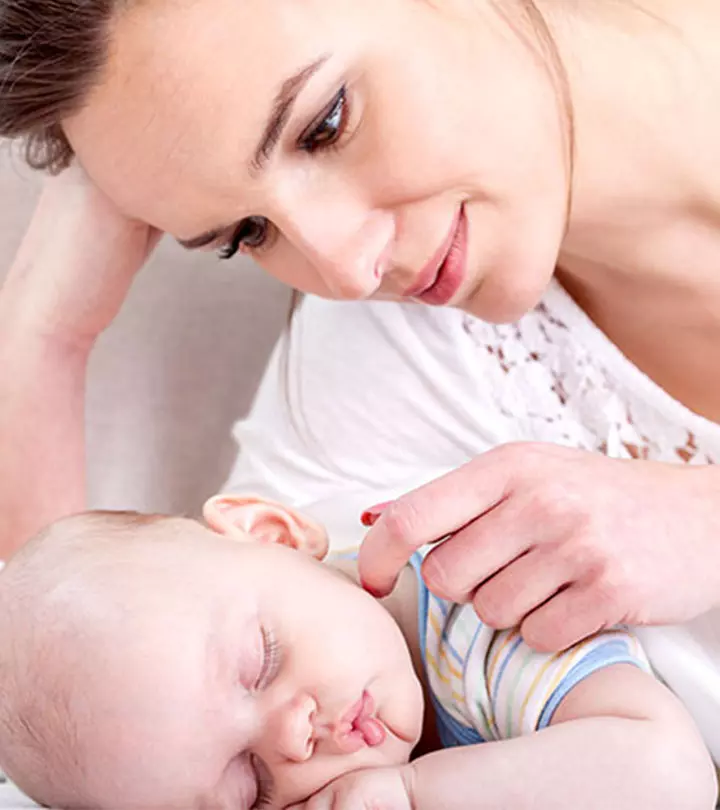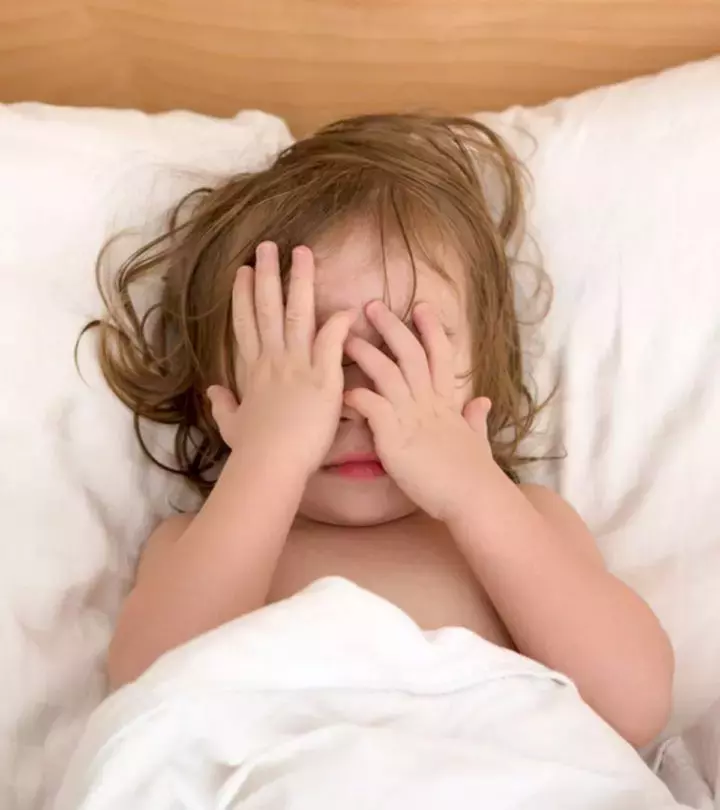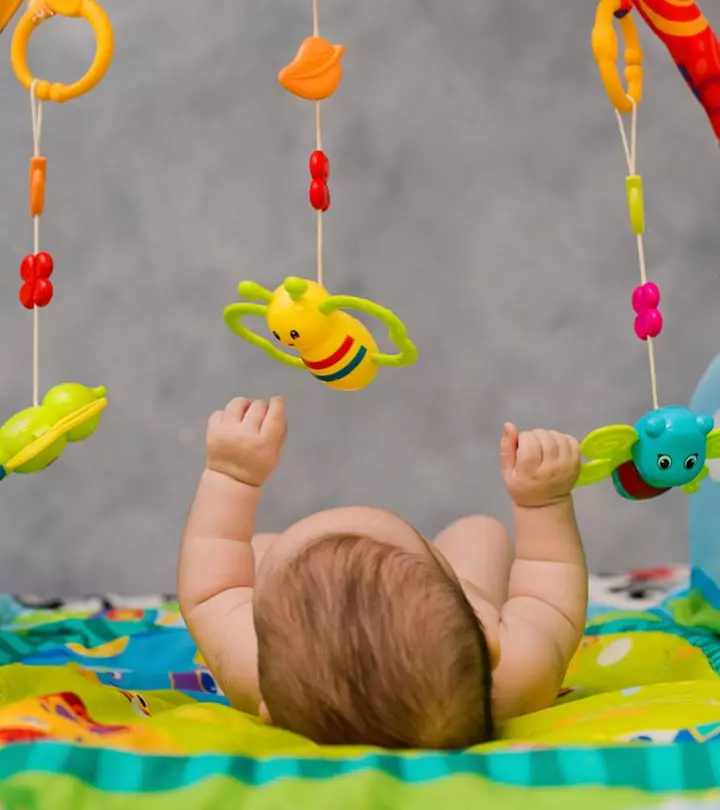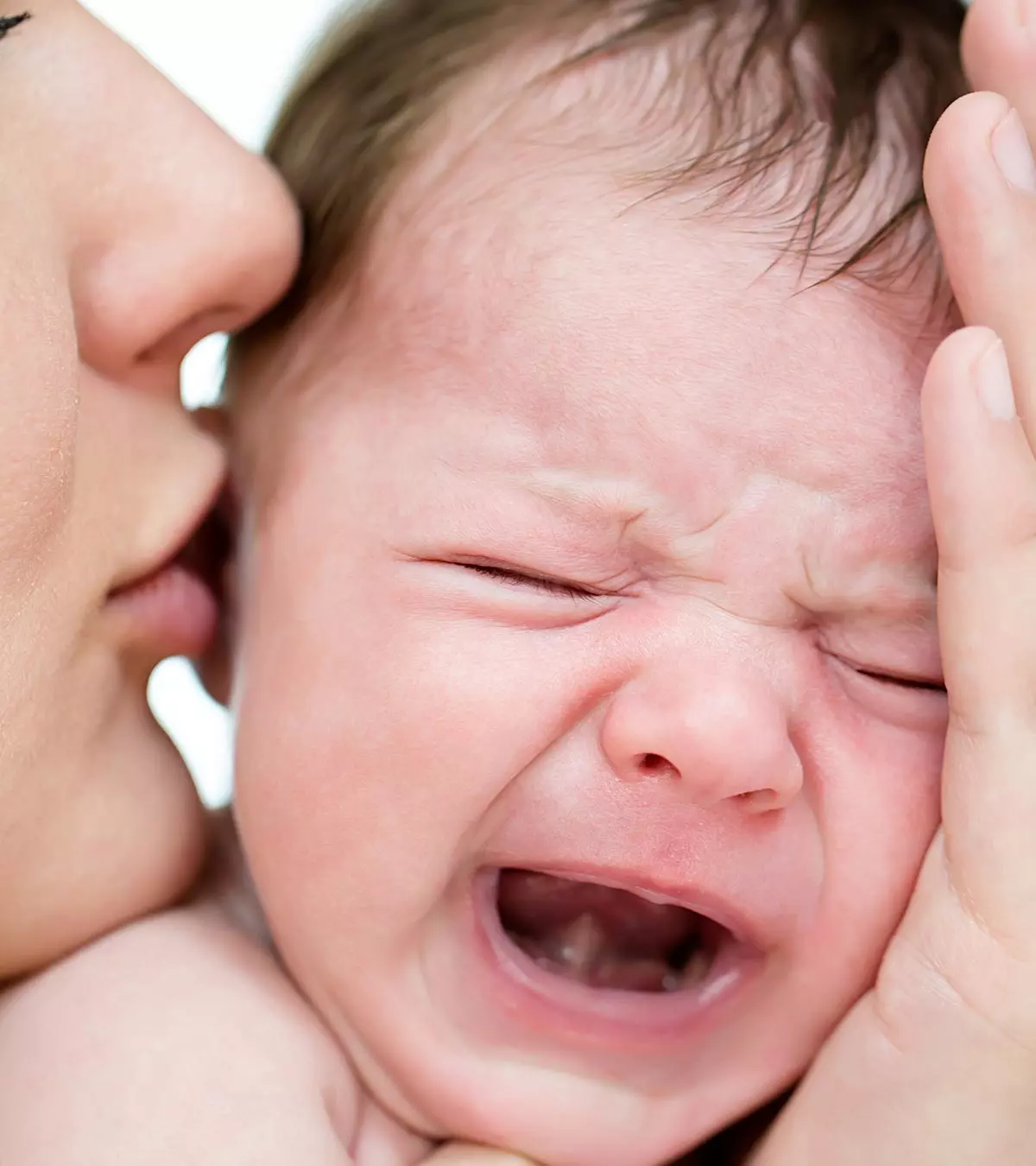
Image: ShutterStock
During their active sleep, babies make involuntary movements, such as giggles, smiling, or nighttime murmuring.

You may have also noticed your baby sigh during sleep. As there is a general perception that sighing means sadness, your baby’s sleep sighs might have made you wonder if your baby is feeling distressed or uncomfortable due to pain in some part of their body. Read this post to know why your baby sighs while sleeping and some facts about your baby’s natural sleeping pattern.
Key Pointers
- Babies who sigh during sleep exhibit a healthy sleep pattern, regulating their breathing, increasing oxygen absorption, forming short-term memory patterns, and boosting their autonomic nervous system.
- Increased brain activity, interrupted airflow, and irregular breathing and heart rates during REM sleep cause babies to sigh more.
- For a baby’s physical and mental growth, it is crucial to maintain regular sleep schedules, nighttime routines, and a natural uninterrupted sleep rhythm.
Common Noises Babies Make During Sleep
Babies can make a variety of sounds while sleeping. These new noises might surprise or even puzzle new parents. However, most of these sounds or noises are normal. Some of the most common sounds babies make during sleep are:
- Grunting: Grunting is a common sound babies make while sleeping, especially when they are in light sleep. They may also grunt while they are adjusting breathing patterns or passing gas or stools. Grunting is normal for babies unless it is accompanied by other signs of distress such as difficulty in breathing or unusual changes in color.
- Gurgling: Gurgling sounds may come from saliva accumulating in the mouth or air passing through the vocal chords. Usually, they are a result of your baby trying to explore their vocal range even in sleep.
- Sighing: Many babies sigh gently during sleep. This may indicate a change in sleep cycles. Sometimes, they may also sign when the baby is relaxed.
- Snorting: If there is any blockage in their nasal passage, babies may snort or snuffle in their sleep. This is not necessarily associated with having a cold. As babies have tiny nasal passages, this can occur quite frequently as the mucus flows back into the nasal passage when they are lying on their backs and are completely relaxed. Cleaning the nose with a soft, damp cloth regularly can help.
- Hiccups: As babies have immature diaphragms, hiccuping during sleep is quite common. Typically, they do not disturb sleep and the baby is likely to outgrow this condition in a few months.
- Whimpering: Babies might whimper or fuss while sleeping. This usually happens when they are in deep sleep and are dreaming. They might also fuss or even cry out when they are moving from one sleep cycle to another. Typically, this happens in sleep and gently comforting them might work. Babies do not wake up while this happens.
Though unexpected, these noises are a sign of normal development. Your baby is adjusting to life outside the womb and these noises show how they are learning to breathe, sleep, digest, and relax. Parents might be concerned about these noises but usually, they are not a source of worry. However, if they are accompanied by other signs of discomfort, you should consult your doctor immediately. You can also talk to your baby’s pediatrician about these sounds during their regular check-ups.
Understanding A Baby’s Sleep Sigh

Image: Shutterstock
Yes, babies do sigh a lot in their sleep. But a sigh during sleep is nothing to worry about as it indicates a relaxation response, ensuring that your baby’s body is taking care of itself. In fact, it is a sign of a healthy sleep pattern (1).
There has only been limited research on baby sleep sighs and the role they play in the development of babies. These studies, however, indicate a few good reasons why babies sigh in sleep.
- When babies sigh in sleep, this movement aids the lung airways to open up and absorb more oxygen. A baby’s lungs are still developing, and his tiny airways may need some support from time to time to work efficiently (1).
- A sigh might help regulate baby breathing patterns. A baby’s sleep sigh may help form short-term memory patterns, which may affect their breath movements and the gaps between each breath (1). A sigh reflex may also help a baby respond well to different noise levels and varied movements through this type of breath regulation.
- A baby’s sleep sigh may also give a boost to his autonomic nervous system (ANS). ANS regulates many internal organs (2). It also controls many muscles and glands in the body. A baby’s sigh helps to reset the ANS (3).
 Health fact
Health factSome Interesting Facts About Babies’ Sleep Sigh
- Preterm babies tend to sigh more than term babies (5).

Image: Shutterstock
- Babies sigh more during Rapid Eye Movement (REM) sleep (6). REM sleep is synonymous with an increase in the brain’s activities. During this ‘active’ sleep cycle, our bodies are immobile, and our heart and respiratory rates become irregular when compared with Non-Rapid Eye Movement (NREM) sleep or ‘quiet’ sleep cycle.
- One important factor to consider for a better understanding of a baby’s sigh is to know about the apneic pause. The pause refers to an interruption of airflow for about a few seconds during normal breathing. A sleep sigh in babies can occur with or without apnea. during various sleep stages. During REM, sighs without apnea occur while the opposite is true for non REM sleep cycles.
Some Baby Sleep Facts
A better understanding of your baby’s natural sleep cycle will allow you to help them sleep better (6).
- Newborns may sleep anywhere between 14 and 17 hours a day. Some newborns may even sleep for 18 to 19 hours a day.
- Every baby’s sleep needs and patterns may differ. It is important to let babies enjoy their natural sleep rhythms. But this in no way means you can’t help your baby develop regular sleep schedules.
- Sleep patterns may affect neonatal development and growth patterns.
 Do remember
Do rememberA study determined the accuracy of a mother’s perception of the relationship between infant feeding methods and sleep. The study recorded the mother and baby’s sleep duration and compared the mother’s perception of the infant’s sleep time to the actual data measured by actigraphy (monitoring human rest/activity cycles).
Findings highlighted maternal perceptions of night-time infant sleep vary based on infant age and feed type. In early infancy, maternal reports of infant sleep closely matched actigraphic data. However, as infants reached 8-18 weeks of age, the differences in values between maternal reports and actigraphic data increased.
The findings also revealed that exclusively breastfeeding mothers overestimated the longest sleep period (LSP) to a lesser extent than formula-feeding mothers.

Comparison of sleep periods of breastfed and formula-fed infants
Source: Biologically normal sleep in the mother-infant dyad; American Journal of Human BiologyConnection Between A Baby’s Good Sleep Cycle And Health

Image: Shutterstock
A study indicates that a healthier sleep pattern during infancy may affect a baby’s mental and physical growth (7) So, if your baby sighs in sleep, rest assured that he is sleeping well. Healthier sleep patterns may indicate optimum growth spurts in babies. But it is important to always monitor your baby’s sleep patterns and look for signs of sleep disturbances so that you may know in time if your baby needs to see a doctor. So, rest assured and take comfort in your baby’s sigh!
Frequently Asked Questions
1. Why does my baby make squeaky noises while sleeping?
Soft squeaky noises in the newborn period can be normal, and it goes away when the baby grows. However, loud or high-pitched squeaky noises can be signs of laryngomalacia in babies. The sound may often worsen during sleeping on their backs, crying, or feeding. You may seek medical care for loud squeaky sounds in babies (8) (9).
2. What does a congested baby sound like?
The sound of a congested baby or child is called stertor. This is more like a snoring sound. Stertor indicates that the airway is obstructed in the nose or mouth. It is common during colds, flu, and allergies (10).
3. Is there anything I can do to help my baby stop sighing during sleep?
Sighing in babies is not indicative of health issues. In fact, it forms a part of their healthy development. Therefore, no remedial steps are required to reduce or stop the phenomenon.
4. How can I ensure my baby gets enough restful sleep?
Identify baby sleep cues and put them to bed when tired, develop a daily sleep routine (consistent sleep and wake time), ensure that the environment is dark, cold and calm, and follow a bedtime routine (warm bath, massage, or stories) to help your baby get enough restful sleep (11). Parents may also engage in lullaby humming to their crib cooing babies to encourage sleeping.
5. Is there a difference between sighing during sleep and snoring in babies?
Sighing is a normal developmental phenomenon in babies. However, persistent snoring may indicate underlying respiratory issues. For example, infections or allergies may cause blockage of the nasal passages. Additionally, snoring may be a symptom of sleep disorders known as apnea in infants, especially babies with congenital anomalies that cause structural problems in the nasal or oral pathways (12).
6. Is it possible for babies to have nightmares while sighing during sleep?
If you have witnessed your baby sigh during sleep, it is an indication that they are sleeping well and healthy. It is a part of their sleep behavior through which they regulate their breathing and internal organs, ensuring sound sleep and healthy development. The sighing allows the baby’s airways to open up, letting the lungs absorb more air. It can eventually help the baby sleep better. Moreover, sound sleep is the key to good health. So do not worry if your baby sighs quite often while sleeping.
Infographic: Interesting Facts About A Baby’s Sigh
Sleepless nights may have left you feeling exhausted. However, knowing facts about the reasons for your baby’s sigh will help you understand the root cause behind them and will help keep unnecessary worry at bay. So, check out the infographic below and share it with parents of other infants too. Illustration: Momjunction Design Team
Illustration: Why Does Your Baby Sigh During Sleep?
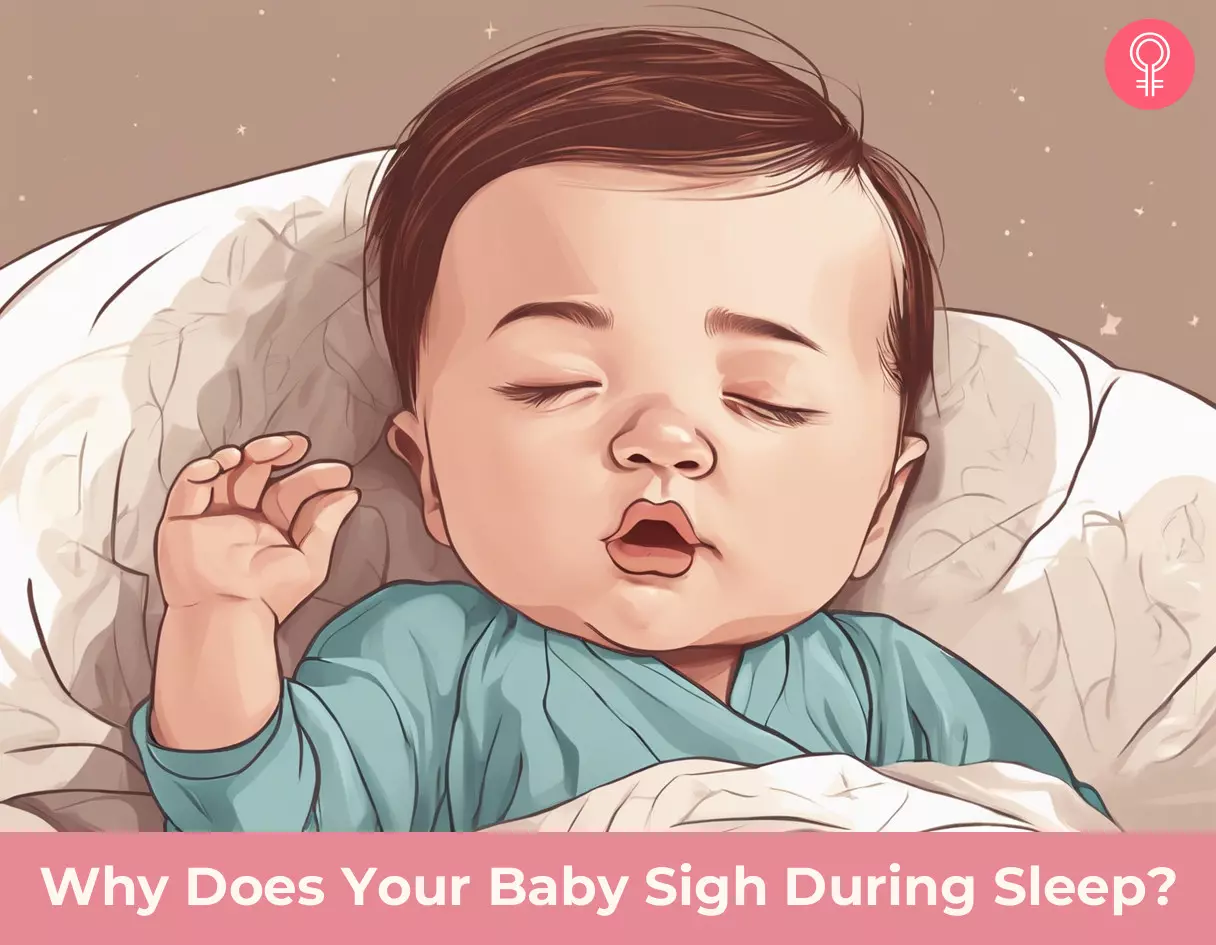
Image: Stable Diffusion/MomJunction Design Team
Learn all about baby sleep in this informative video! Get tips on how to help your baby get the rest they need.
References
- Infants Sighs May ’reset’ Breathing Regulation Mechanism As Well As Help Lungs Develop.
https://www.eurekalert.org/news-releases/556011 - Neuroscience For Kids.
https://faculty.washington.edu/chudler/auto.html - Is Sighing A Resetting Mechanism Of The Autonomic Nervous System
https://www.researchgate.net/publication/246297091_Is_sighing_a_resetting_mechanism_of_the_autonomic_nervous_system_158 - Autonomic Nervous System Disorders.
https://medlineplus.gov/autonomicnervoussystemdisorders.html - Different Patterns Of Sigh In Neonates And Young Infants.
https://pubmed.ncbi.nlm.nih.gov/9657665/ - Children And Sleep.
https://www.sleepfoundation.org/children-and-sleep - Infant Growth Spurts Tied To More Sleep.
https://www.webmd.com/parenting/default.htm - When Should a Parent Be Concerned With a Baby’s Noisy Breathing?
https://healthier.stanfordchildrens.org/en/when-should-a-parent-be-concerned-with-a-babys-noisy-breathing/ - When Should a Parent Be Concerned With a Baby’s Noisy Breathing?
https://healthier.stanfordchildrens.org/en/when-should-a-parent-be-concerned-with-a-babys-noisy-breathing/ - Stridor Versus Wheezing: When Noisy Breathing Is Something More.
https://www.hopkinsmedicine.org/health/conditions-and-diseases/stridor-versus-wheezing - Sleep in Infants (2-12 Months).
https://www.nationwidechildrens.org/specialties/sleep-disorder-center/sleep-in-infants# - Diagnosing Sleep Apnea in Children.
https://nyulangone.org/conditions/sleep-apnea-in-children/diagnosis - Nightmares.
https://www.sleepfoundation.org/nightmares
Community Experiences
Join the conversation and become a part of our nurturing community! Share your stories, experiences, and insights to connect with fellow parents.
Read full bio of Dr. Elna Gibson
Read full bio of Jessica Albert
Read full bio of Rohit Garoo
Read full bio of Vidya Tadapatri





